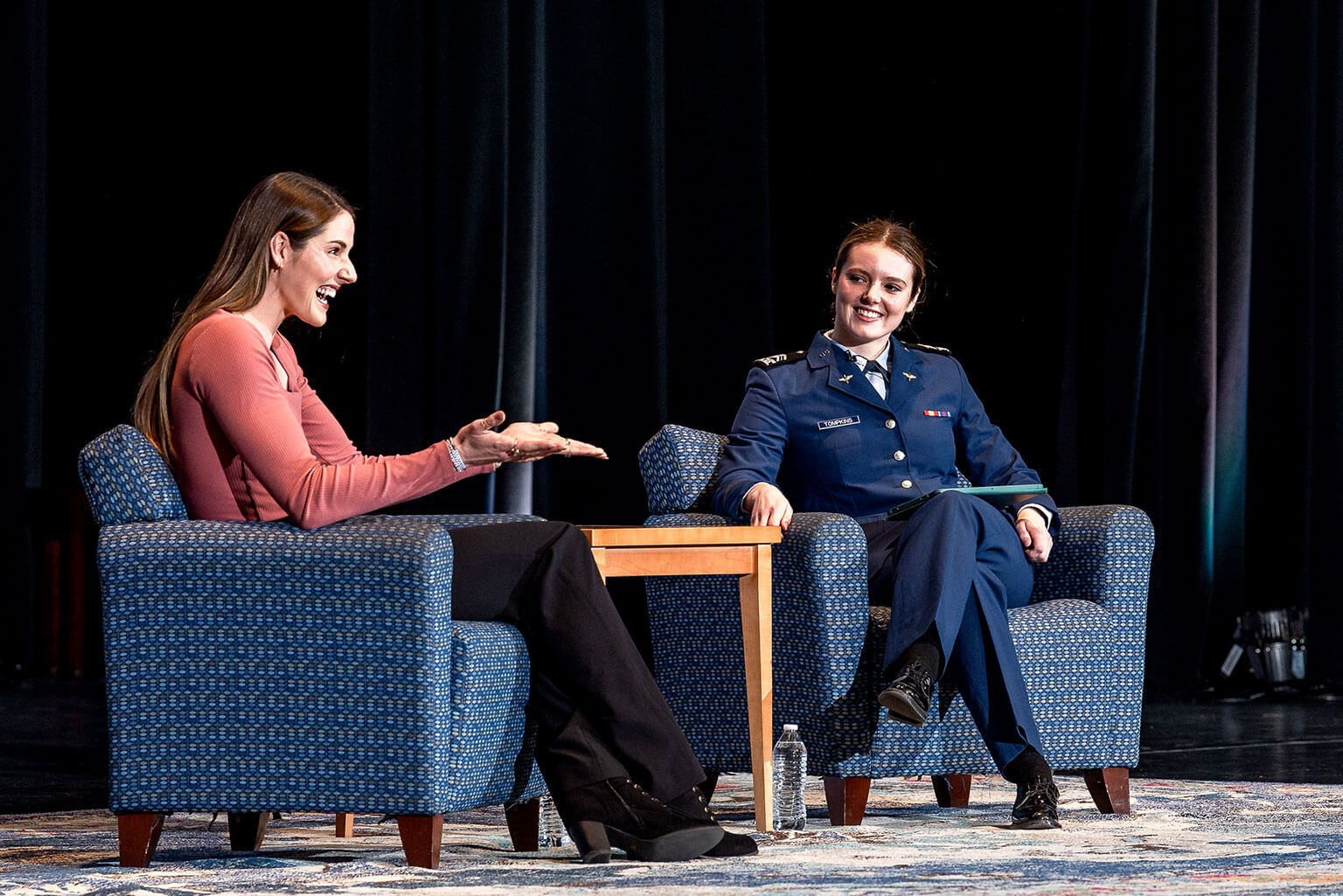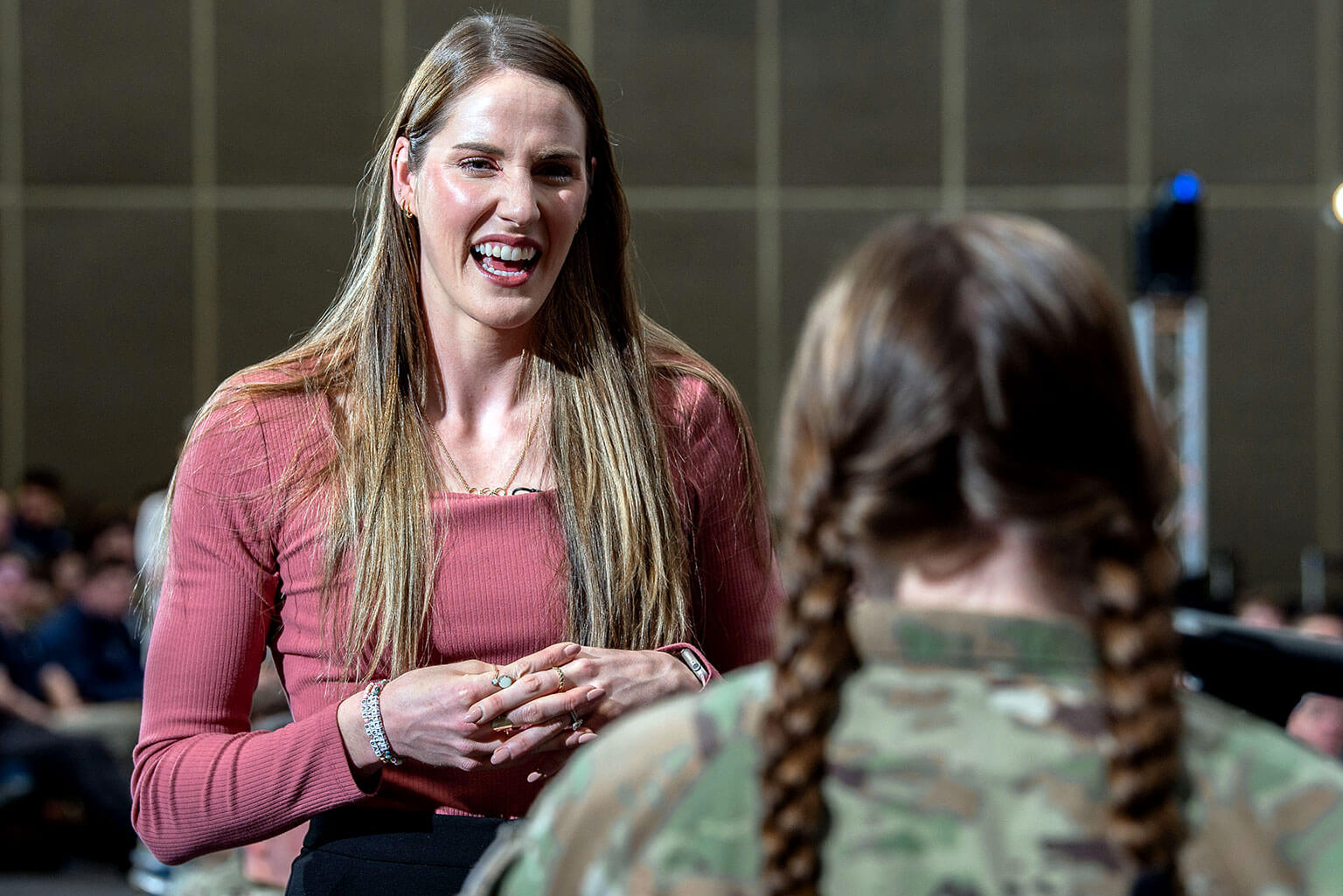Missy Franklin shares team concepts with cadets
 Five-time U.S. Olympic swimming gold medalist Missy Franklin speaks at the National Character and Leadership Symposium Feb. 23, 2024. Franklin discusses how culture and connection were a part of her journey to Olympic gold. (U.S. Air Force Photo by Rayna Grace)
Five-time U.S. Olympic swimming gold medalist Missy Franklin speaks at the National Character and Leadership Symposium Feb. 23, 2024. Franklin discusses how culture and connection were a part of her journey to Olympic gold. (U.S. Air Force Photo by Rayna Grace)
By Randy Roughton
U.S. Air Force Academy Strategic Communications
U.S. AIR FORCE ACADEMY, Colo. – It isn’t every day that you get to meet your childhood hero, but the 31st annual National Character and Leadership Symposium provided Cadet 2nd Class Darien Tompkins with so much more. The U.S. Air Force Academy Women’s Swimming and Diving Team member led a discussion with five-time Olympic gold medalist Missy Franklin.
“I have looked up to Missy as an athlete for the majority of my life,” Tompkins said. “I remember sitting in my living room at 9 years old and watching her dominate the London Games, thinking I wanted to be like her when I grew up. Being her moderator is a dream come true.”
Cadets gave Franklin a standing ovation after her keynote at NCLS. Franklin, now a female empowerment and mental health advocate as well as a motivational speaker, shared lessons on how to be good teammates, handle adversity and persevere toward a goal.
 U.S. Olympic swimming gold medalist Missy Franklin and Cadet 2nd Class Darien Tompkins at the National Character and Leadership Symposium Feb. 23, 2024. Franklin shares her story of resilience.
U.S. Olympic swimming gold medalist Missy Franklin and Cadet 2nd Class Darien Tompkins at the National Character and Leadership Symposium Feb. 23, 2024. Franklin shares her story of resilience.
Swimmers go from being fierce competitors to teammates
Franklin shared the example of making an Olympic team to demonstrate how individuals can form a cohesive unit. Olympic hopefuls compete against each other for months before what she called “the most exhausting eight days” in the sport. Eventually, the difference between making or missing the team at the Olympic trials can be decided by one-hundredth of a second. The athletes’ next opportunity comes four years later.
“We become a cohesive Team USA after battling against each other with everything we have,” Franklin said. “But we do it every time. The important thing is to remember why you are doing it and that what you are representing is so much greater than yourself. Whether that is in swimming, in the classroom or your career, it is the coming together and understanding the bigger picture that is important.”
Supporting teammates even on bad days
Franklin attended her first Olympic Trials in 2008 when she was just 12 years old. At 17, she won four gold medals and set the world record in the 200-meter backstroke at the London Summer Olympics in 2012. However, four years later, Franklin was diagnosed with depression, insomnia and a eating disorder. She was disappointed at the 2016 Summer Olympics in Rio where she failed to progress beyond the semi-finals in her two individual events. Still, she won another gold medal in the team 4×200-meter relay competition. Franklin said she was proud of the team gold due to “the grit and resiliency” it took to achieve it. Crushed by not making the finals in the 200-meter backstroke, Franklin said she fought through her disappointment and tears. She realized she needed to support her teammate who made the finals.
“I understood that my teammate made the Olympics final, and my job was to support her regardless of what was going on in my own life,” Franklin said. “I watched and supported with my teammates, and she won the gold medal in an upset. I remember thinking that I would have never forgiven myself if I had not shown up to support her. Being a good teammate is about supporting each other on all our good days and bad days.”
Cadet teamwork in action
Tompkins said she has seen the same dynamic in action on the Academy swimming team. They spend hours in practice competing against each other but always support each other when it counts. The team members can take that mentality into their careers, she said.
“This is applicable to cadet life and all careers, especially those in the military,” Tompkins said. “We are constantly put against each other in terms of performance and career opportunities, but, in the end, we are here to carry out the same mission. Embracing a positive mindset and being a supportive teammate is the key to our success.”
 Five-time U.S. Olympic swimming gold medalist Missy Franklin speaks at the National Character and Leadership Symposium Feb. 23, 2024. Franklin answered questions from audience members. (U.S. Air Force Photo by Rayna Grace)
Five-time U.S. Olympic swimming gold medalist Missy Franklin speaks at the National Character and Leadership Symposium Feb. 23, 2024. Franklin answered questions from audience members. (U.S. Air Force Photo by Rayna Grace)
Enjoying the process while working toward a goal
One final lesson Franklin shared from her career with cadets is that achieving something important takes work and perseverance. Even though they may not see immediate results, like a swimmer trying to achieve her best time in the pool, the work must continue. Sometimes, she trains daily in the pool for two to four years before beating her best time, Franklin said.
“But you still work just as hard every day, knowing that it is going to be worth it when you get there,” she said. “That mindset has transferred into every area of my life. I might not see the results tomorrow, but I remain confident in the work that I am doing and enjoy the process.”
Watch Franklin’s full presentation on YouTube. See photos from the 2024 National Character and Leadership Symposium on Flickr.